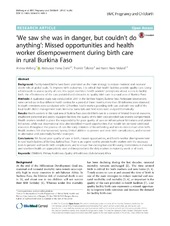| dc.contributor.author | Melberg, Andrea | en_US |
| dc.contributor.author | Diallo, Abdoulaye Hama | en_US |
| dc.contributor.author | Tylleskär, Thorkild | en_US |
| dc.contributor.author | Moland, Karen Marie | en_US |
| dc.date.accessioned | 2016-11-30T11:40:27Z | |
| dc.date.available | 2016-11-30T11:40:27Z | |
| dc.date.issued | 2016-09-29 | |
| dc.Published | BMC Pregnancy and Childbirth 2016, 16(1):292 | eng |
| dc.identifier.issn | 1471-2393 | |
| dc.identifier.uri | https://hdl.handle.net/1956/13157 | |
| dc.description.abstract | Background: Facility-based births have been promoted as the main strategy to reduce maternal and neonatal death risks at global scale. To improve birth outcomes, it is critical that health facilities provide quality care. Using a framework to assess quality of care, this paper examines health workers’ perceptions about access to facility birth; the effectiveness of the care provided and obstacles to quality birth care in a rural area of Burkina Faso. Methods: A qualitative study was conducted in 2011 in the Banfora Region, Burkina Faso. Participant observations were carried out in four different health centres for a period of three months; more than 30 deliveries were observed. In-depth interviews were conducted with 12 frontline health workers providing birth care and with two staff of the local health district management team. Interview transcripts and field notes were analysed thematically. Results: Health workers in this rural area of Burkina Faso provided birth care in a context of limited financial resources, insufficient personnel and poorly equipped facilities; the quality of the birth care provided was severely compromised. Health workers tended to place the responsibility for poor quality of care on infrastructural limitations and patient behaviour, while our observational data also identified missed opportunities that would not demand additional resources throughout the process of care like early initiation of breastfeeding and skin-to-skin contact after birth. Health workers felt disempowered, having limited abilities to prevent and treat birth complications, and resorted to alternative and potentially harmful strategies. Conclusions: We found poor quality of care at birth, missed opportunities, and health worker disempowerment in rural health facilities of Banfora, Burkina Faso. There is an urgent need to provide health workers with the necessary tools to prevent and handle birth complications, and to ensure that existing low cost life-saving interventions in maternal and new-born health are appropriately used and integrated into the daily routines in maternity wards at all levels. | en_US |
| dc.language.iso | eng | eng |
| dc.publisher | BioMed Central | eng |
| dc.rights | Attribution CC BY | eng |
| dc.rights.uri | http://creativecommons.org/licenses/by/4.0 | eng |
| dc.subject | Childbirth | eng |
| dc.subject | Primary healthcare | eng |
| dc.subject | Quality of healthcare | eng |
| dc.subject | Sub-Saharan Africa | eng |
| dc.title | ‘We saw she was in danger, but couldn’t do anything’: Missed opportunities and health worker disempowerment during birth care in rural Burkina Faso | en_US |
| dc.type | Peer reviewed | |
| dc.type | Journal article | |
| dc.date.updated | 2016-10-11T12:11:02Z | |
| dc.description.version | publishedVersion | en_US |
| dc.rights.holder | Copyright 2016 The Author(s) | |
| dc.identifier.doi | https://doi.org/10.1186/s12884-016-1089-3 | |

